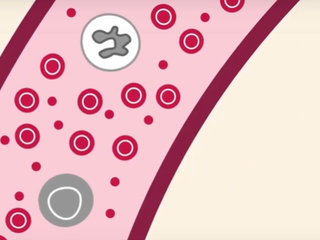What is follicular lymphoma?
Follicular lymphoma is a type of non-Hodgkin lymphoma (NHL). It affects white blood cells called B lymphocytes or B cells.
This in turn affects your lymphatic and immune systems, which are both part of your body's natural defence against infection.
In follicular lymphoma, abnormal lymphocytes gather in lymph nodes (glands) or organs and cause lumps or swellings. The symptoms you have depend on how big the lumps and swellings are, and where they are in your body.
If it's suspected that you have lymphoma, doctors will want to find out what kind you have. If tests show you have non-Hodgkin lymphoma (NHL), they will check whether it's a fast-growing (high-grade) or slow-growing (low-grade) type, because the treatments are different.
Follicular lymphoma is a low-grade (slow-growing) NHL.
Because it's slow-growing, some people with follicular lymphoma won’t need treatment straight away but will have regular check-ups. Your doctor will also classify the lymphoma based on your symptoms and where the lymphoma is in your body. This is called the ‘stage’ of the lymphoma and it helps your healthcare team plan your treatment.
What causes follicular lymphoma?
Nearly 14,000 people are diagnosed with a type of NHL every year in the UK. Roughly 20% of people with NHL (two in ten) are diagnosed with follicular lymphoma.
In most cases, we can’t say what causes follicular lymphoma. But there are some factors that could make you more likely to develop it:
- Age: Follicular lymphoma mainly affects older people. It’s very unusual for people under 40 to get it and it’s extremely rare in children.
- Sex: Follicular lymphoma is slightly more common in women than men. Men are a bit more likely than women to develop other types of low-grade NHL. We don’t know why.
- Family history: It isn’t really known if there’s a definite link between family members and the risk of getting follicular lymphoma. There may be a slightly increased risk if you have a close relative who has it.
- Infections: You might have a higher risk of getting follicular lymphoma or another type of NHL if you’ve had some viral infections, including the HIV virus, human T-cell leukaemia/lymphoma virus (HTLV-1) and the Epstein-Barr virus (EBV), which causes glandular fever. Although EBV is a common virus, only a very small number of people who get it go on to develop NHL.
It’s important to understand that you can’t catch follicular lymphoma or pass it on to someone else.
Transformation of follicular lymphoma
In some people, follicular lymphoma can change into a fast-growing high-grade NHL. This is called transformation. Each year, around 3% of follicular lymphoma cases (three in a hundred) will transform, usually to a type of high-grade NHL called diffuse large B-cell lymphoma or DLBCL.

What is blood cancer?
Find out how blood cancer starts and how it can affect your body
